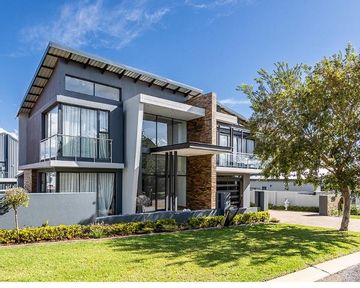Savvy home buyers can capitalise on the current interest rate cycle
Buying the right kind of residential property in the right location and at the right time in an interest rate cycle, are key ingredients for extremely sound investment potential.
Says Carol Reynolds, a Pam Golding Properties area manager for Durban Coastal: “Given that interest rates are likely to start entering a downward cycle later this year, augurs well for home buyers and investors. If you can secure an investment now and get the numbers to work within your budget at the current interest rates, then the advantage of seizing the opportunity to purchase now before house prices start increasing, is that as soon as the cycle turns, you will reap the rewards of the declining interest rates and enjoy greater profitability.
“In many areas, it is still a buyer's market, which means you have the benefit of a good selection of homes to choose from. However, some words of advice - be careful that you don’t over-capitalise, ensure you have sufficient funds to cover maintenance and any period when your property is sitting vacant, and seek high-demand areas where there is low supply.
“If you are looking to acquire an investment property, location and rental returns are the most important factors. In a good location, you will enjoy capital growth and also benefit from sound returns. However, if you invest in an area that is not very appealing nor well-positioned, you could find yourself with very little appreciation over time and low demand from tenants. If you are purchasing an apartment, invest in a good, solid apartment block with healthy financials and a well-managed body corporate.
“If you want to dabble in the short-term letting market, then your investments should be in popular tourist hubs where there is ongoing demand for holiday letting. Another great market is the corporate market - owning residential properties in commercial hubs where commuters are in abundance will also ensure ongoing rental demand among employees and entrepreneurs. If you are seeking a more stable investment with long-term letting potential, then buying in an area where properties are generally in short supply is a good rule of thumb. This will mean that tenant demand is high and you will always be able to secure a tenant without having long vacancies. The student market is another asset class that can be attractive to investors. The benefit of the student market is that parents will sign the lease and they will stand surety for the monthly payments, which minimises your risks as an investor. Students also ultimately move on and vacate, minimising the risk of unlawful occupation.”
Reynolds offers a good starting point when looking to buy residential property: “The key with investing in property is to determine your ultimate strategy - is your goal to build a portfolio to hold in the long-term, or are you looking to renovate and flip? For flipping, a 20 percent deposit works nicely provided your renovation time-frames are short so that you minimise your holding costs. The finance costs will need to be factored into your profit on the flip, and ideally flipping should entail cosmetic changes where no plans are necessary for a quick turnaround time. Transfer costs as well as profit margins need to be carefully considered before entering the flipping market. The most critical factor is buying well - essentially, you need to find a renovator's dream in a good area where there is no price ceiling. This will give you the space and grace to avoid overcapitalising.
“For long-term investing and holding, I suggest gearing such that there is a small shortfall each month which assists with tax liability. For example, if your goal is to buy multiple entry level properties that do not attract significant transfer costs, then each unit could be geared with an approximate 30% deposit and a 70% loan-to-value (LTV), to achieve a return of around 6% or 7% which will result in the rental amount almost covering costs, but not quite, leaving a monthly shortfall which can then be offset against your annual tax liability. It is more prudent to buy entry level properties around the R1million to R2million mark as transfer costs are significantly lower at this level and rental returns are usually higher in this price band than they are with more expensive homes. For example, if you have saved up R1 million to invest, I would suggest buying 3 x R1 million apartments and putting down 30% deposits on each one. At the moment, in the Durban North and uMhlanga/La Lucia areas we are achieving rentals of around R7000 per month on apartments priced at around R1 million, so the numbers work perfectly well at this level. Just be sure to check on the rates and levies, taking these into account to calculate your costs before you enter into a transaction.”
Reynolds says if this is your first foray into the buy-to-let market, it’s best to start with one small property and a deposit of approximately 30%. Be sure to do your market research and ask your local estate agents what rental returns you will be able to achieve on the property. Once you know what rent you will achieve, then you can reverse engineer the numbers to ensure that you can afford the small shortfall each month. Alternatively, you could delay the purchase until you have managed to save up for a slightly higher deposit, which will then enable you to do a 50% LTV in which event, the monthly rent should cover your costs in full.
Should you look at buying in your own home town/city or further afield? Says Reynolds: “There are two schools of thought here: if you buy in your own town, the advantages are that you can manage and maintain your property with ease, you can meet and greet your tenants for better screening and you will probably have a better understanding of your local market to make better decisions around location and high demand areas. However, the age-old adage about diversification being critical to any investment strategy, would suggest that it is better not to own all your properties in one market, but rather to diversify into different areas. Procure some national statistics from your local estate agent and find out which areas are in demand from a rental perspective, and then make a decision according to your budget and needs. If you decide to purchase outside of your residential area, then you will need to find a good manager or agent to help you maintain and manage your property. Apart from rates and maintenance, costs, the additional costs of these management fees need to be factored into your sums when making your decisions.”
As to what size and type of home you should you be looking to buy, again, this depends on your strategy. Reynolds says if you are simply wanting a low risk, high return property portfolio with less capital growth, then one and two-bedroom apartments are always a good option. “However, if you are seeking capital growth as well as fair returns, then houses that can be renovated and upgraded over time are a great option. The beauty of finding such homes is that you can enjoy growth instantly by undertaking a cosmetic renovation, which in turn will enable you to secure a better calibre of tenant, and in time you should enjoy capital growth - on the proviso that you have purchased the property in a good area. Budget is always the key determinant – freestanding houses are generally more expensive and require more maintenance, but they do not attract levies which reduces your monthly costs.
“Regarding key features which tenants want, for the most part, tenants are more interested in modern homes than they are in older properties. A tenant will want a safe property, close to amenities, in excellent condition, rather than a large gracious rambling property in poor condition. Condition is key, and it is far easier to procure a tenant if you have a newly renovated property. Tenants also want to be able to visualise their own furniture in your property, so a blank neutral canvas is ideal rather than anything that is too customised. Small practical factors such as secure, accessible parking, 24-hour security, and low maintenance living are also preferable. Pet policies can limit the tenant pool significantly as well, so investors need to decide whether they are comfortable widening their options by allowing pets, or whether they would prefer to minimise maintenance issues by prohibiting pets.
“Should you buy a fixer-upper or a more modern well-maintained home? This is a personal choice: if you enjoy renovating and have contacts who can deliver a renovation that won't break the bank, then I always err on the side of going for a renovation as this will enable you to instantly add value to your property and transform it to your taste. However, if time is of the essence and you simply want to invest and immediately procure a tenant, then a newer home is preferable. In the latter instance, you will need to wait longer to enjoy any capital growth on the property, but you should be able to enjoy good rental returns from the outset.
“The general rule is that cheaper properties enjoy higher returns, however, one needs to be mindful of securing quality tenants. So again, it is a balancing act between high returns, good long-term growth, and finding good quality tenants. Coastal towns do well with holiday letting, business hubs are great for corporates and long-term lets, while suburbs with excellent schools are ideal for small family homes and building a portfolio of townhouses or family homes.”
Adds Reynolds: As to how long you should hold onto the investment property before divesting - in a perfect world, never sell your properties. Unless the market starts to tumble and the currency devalues significantly, my rule of thumb is to always be a buyer and never be a seller. If you need to sell then of course, circumstances will dictate, but always try and reinvest into the property market as soon as you can.”

